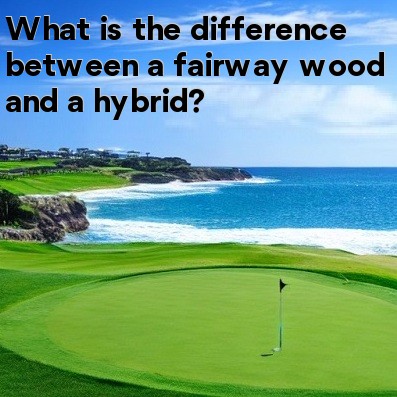
In golf, what is the difference between a fairway wood and a hybrid?
When it comes to hitting long shots from the fairway or rough, golfers have a few club options. Two popular options are fairway woods and hybrids. Both clubs are designed to provide distance and versatility, but they have some differences that can impact a golfer's game.
- Design: Fairway woods have a larger clubhead and longer shaft compared to hybrids. They often have a shallow face and a lower center of gravity, which helps launch the ball high into the air with less spin. On the other hand, hybrids have a smaller clubhead and shorter shaft, resembling a combination of an iron and a fairway wood. The clubhead design of hybrids allows for better control and accuracy.
- Distance: Fairway woods are known for their distance capabilities. Due to their larger clubheads, longer shafts, and lower center of gravity, fairway woods can generate more clubhead speed and distance than hybrids. This makes fairway woods a popular choice for golfers who want to maximize their distance off the tee or on long approach shots. Hybrids, although not as long as fairway woods, still provide ample distance and are more forgiving on mishits.
- Versatility: Hybrids are often referred to as the “utility clubs” because they offer greater versatility compared to fairway woods. Hybrids are designed to replace long irons, which are notoriously difficult to hit. Their smaller clubheads and iron-like design make them more maneuverable and suitable for a variety of lies and shots. Fairway woods, while providing distance, are primarily used for long shots from the fairway or rough.
- Forgiveness: When it comes to forgiveness, hybrids are generally more forgiving than fairway woods. The design of hybrids, with their larger sweet spot and lower center of gravity, helps golfers achieve better launch and accuracy on off-center strikes. Fairway woods, due to their larger clubheads and lower center of gravity, may prove less forgiving on mishits.
- Use in the Bag: A golfer's choice between a fairway wood and a hybrid ultimately depends on their skill level and preferences. Players with higher swing speeds and a background in traditional golf may prefer using fairway woods for distance off the tee and long approach shots. On the other hand, golfers who struggle with long irons or require more versatility may find hybrids to be a better fit for their game. Many golfers opt to carry both fairway woods and hybrids in their bags to take advantage of the strengths each club offers in specific situations.
In conclusion, fairway woods and hybrids are two distinct club options golfers have when it comes to hitting long shots. Fairway woods excel in distance and are a go-to choice for maximizing distance off the tee or on long approach shots. Hybrids, on the other hand, offer versatility, forgiveness, and are a more suitable replacement for challenging long irons. Both clubs have their advantages, and the choice between them ultimately comes down to a golfer's skill level and personal preferences.





